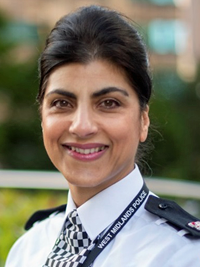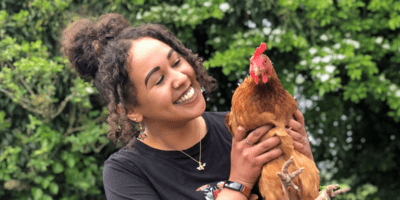Chief Superintendent Harvi Khatkar is vice president of the Police Superintendents’ Association (PSA), the association that represents superintendents and chief superintendents in 49 police forces. She was elected to the PSA in 2021 as lead for Black, Asian and Minority Ethnic members, before becoming vice president in March 2022. Harvi has served with West Midlands Police for 28 years and she is the first female superintendent, tactical firearms commander and public order bronze commander in her force from a Black, Asian or minority ethnic background.

“There will always be people who have a negative view of positive action, and my simple advice is to not allow these individuals to stop you achieving your goals.”
Educational background and career to date
After completing my O-levels at school, I went on to take my A-levels and completed a degree in business studies, which I studied for part time, whilst working full time.
I worked for my local authority before joining West Midlands Police, and whilst in the force, I also studied for a postgraduate diploma in management and an MBA with the Open University.
I served with West Midlands Police for 28 years and reached the rank of superintendent in 2017, and then chief superintendent in 2020. I’ve worked across the force in areas including local policing, response, operations, integrated offender management, partnerships, and intelligence. I have also led on Home Office-funded projects in relation to hate crime, domestic abuse, and missing children, which resulted in changes to policy in force, the local authority and the Crown Prosecution Service.
At the rank of superintendent, I worked in local policing before becoming the Senior Responsible Officer for the force’s biggest IT change programme, a role I undertook for two years. I then went on to become head of criminal justice services before being elected to the position of vice president of the Police Superintendents’ Association (PSA) in March 2022.
Driving forward positive change
The PSA is a member association, representing police officers at the rank of superintendent and chief superintendent. It works to support members’ best interests, on issues such as pay, development and well-being, and is a positive and influential voice in policing. It currently has around 1400 members, made up of superintendents from 49 police forces.

I joined the association’s National Executive Committee (its policy-making body) in 2021, as the reserved representative for Black, Asian and minority ethnic members. That’s a role that I felt very passionate about, having worked for the service for so long and having seen the journey that it has been on when it comes to workforce representation and inclusion.
I’m the first woman of colour to serve on the association’s national team and I want to make a difference to the ‘face’ of our association, and also to the experience of our members. Through my role as vice president, I have a privileged position and a voice that can be heard, so I want to drive forward the change we need to see not only at senior levels in policing, but across every rank and within the association.
I bring lived experience to the role, which is so crucial in working towards inclusion.
Representing under-represented colleagues
The PSA has ‘integrated reserved seats’ on its National Executive Committee for members to represent superintendents from under-represented backgrounds. We have a member who represents disabled colleagues, one who looks at gender issues and a lead for LGBTQ+ members.
The roles are crucial in making sure that our association can truly represent our membership, whilst also influencing national policing matters that are linked to these areas. We engage with our staff association colleagues and other national working groups and forums to put forward the experiences of our members and to make positive and proactive change.
This has led to significant progress in several areas such as through the creation of our Future Supers programme, which supports police officers and staff from under-represented groups into senior roles.
‘Being the first’
I wouldn’t say that I experienced distinct hurdles because of my background, but I certainly felt hampered by the perception and implications of ‘being the first’. Being the first in any role puts a certain amount of focus on you, which can lead to the inevitable feelings of having to prove yourself to be better, which should not be the case.
I was lucky to work in so many different areas of policing at West Midlands Police, and not all of them were areas in which I had extensive experience. For example, when leading the force’s biggest ever IT change programme with consultants, Accenture, I had to quickly learn the IT language, whilst faced with a huge culture change requirement alongside the operational project.
Change of this size needs the buy-in and understanding of staff, and that only works when we prepare them for change. As the lead for this project, I had to be seen as credible and I had to ‘sell’ the change programme to them, whilst listening to their concerns, their questions and building a plan that would engage them, and help bring them on the journey.
I’m pleased to have achieved a lot in the roles I’ve worked in, bringing down reoffending rates when working in offender management, which received national recognition, and influencing changes to national hate crime policy, both in force and as part of the wider criminal justice sector.
I was also able to lead a Home Office-funded project in force to help us better understand domestic abuse against women in the Asian community. This was a pioneering project in force at the time and, working with an outreach programme, we delivered joint domestic abuse training to officers, which positively changed the perception of how officers saw victims.
It highlighted some of the cultural challenges victims faced. I led a scrutiny panel linked to stop and search procedures. During this latter example, we combined training for officers with sessions involving members of the public, so that officers could hear first-hand experience of communities, and worked with youth groups to really hear from those who were affected by our policies. This was flagged as best practice in force and for me.
I’ve more than proved myself capable in the roles I’ve undertaken, but that doesn’t mean I haven’t had feelings of imposter syndrome, which can be more common in women. Whilst it is important to recognise these feelings, it should not stop you from achieving your potential. It’s important to make use of mentoring and coaching, develop a good support network around you, and build up your personal resilience. There will always be people who have a negative view of positive action, and my simple advice is to not allow these individuals to stop you achieving your goals.
I’m trained in firearms command and public order – roles that are traditionally male-led, but it’s so important for women to see other women in these roles and succeeding. I didn’t always appreciate the impact of role modelling, but I believe it’s crucial in creating a workforce that is truly diverse.
There is always the chance that people from under-represented groups will feel they have to prove themselves and that they need to show they’re better than others to be worthy of the role, but that absolutely should not be the case. I want people to see me in the roles I’ve had and believe they can do the same.
Breaking down barriers when engaging with different sections of the community

Working better with communities is something I’ve always prioritised. As a senior police officer, I have led community reference groups. and what’s important to me is to be honest in my communication, in terms of what I can and can’t do because of our policies and processes. We shouldn’t hide from it.
Listening to and respecting other viewpoints is also important as you don’t always get it right. It’s about building long-term relationships, earning, and maintaining respect and breaking down barriers. It’s the positive feedback from these groups that constantly reminds you why you are doing the job you are. It can be very humbling.
A job like no other
My advice to women and girls about pursuing careers in the police, and indeed to anyone from other under-represented groups, is that you must go into policing with your eyes wide open for the challenges ahead but also for the wealth of opportunities that are on offer.
It’s tough, and you need to be strong and resilient with a network of support around you, but it’s a job like no other. I wouldn’t change my career journey and I honestly hope that stories such as mine will inspire other people to make that first step. I’ve had my battles, but my resilience and determination, with fantastic support from people around me has got me to where I am now. The same can happen for anyone who wants to succeed in policing.
Coming up next
My term as vice president of the Police Superintendents’ Association lasts for three years, so I’ll be in post until 2025. As I approach the end of my first year, which has flown by, I’m really pleased about the relationships I’ve built with key policing stakeholders such as the College of Policing, National Police Chiefs’ Council and colleagues in His Majesty’s Inspectorate of Constabulary and Fire & Rescue Services, as well as the progress I’ve helped to make in a number of key areas.
Another great CPD session ‘speaking truth to power ‘ @MeganReitz1 . Great insights and useful tips . Next session on 24th January from 11am -12.30 & look forward to it . Thanks to @CollegeofPolice for their support pic.twitter.com/CAjMI1ADWX
— Harvi Khatkar (@HarviKhatkar) January 10, 2023
There’s so much more I want to achieve, for our members and for the wider Service, and I want to make sure that we sustain the difference we now have in the PSA. It would be wonderful to have more people of colour moving into the ‘supers ranks’ – less than 9% are currently from a Black, Asian or minority ethnic background – but also involved in our national roles. Projects such as Future Supers are helping here, and the second year of the programme has been going fantastically well, with many stories of promotion success being shared with us.
I’m extremely determined when it comes to my work, so these small successes drive me to bring further positive influence on policing.





